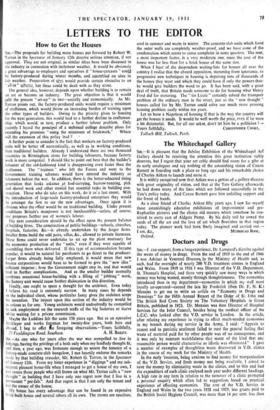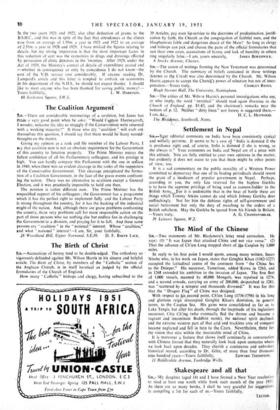Doctors and Drugs
SIR,—I can support, from a long-experience, Dr. Lampard's diatribe againsf the waste of money in drugs. From the end of 1919 to the end of 1946 I was Adviser in Venereal Diseases, to the Ministry of Health and, as such, had the oversight of nearly 200 V.D. treatment centres in England and Wales. From 1919 to 1936 I was Director of the V.D. Department, St. Thomas's Hospital, and there very quickly saw many ways in which money was being wasted, mostly through thoughtlessness. The economies introduced then in my department—economies in which my staff most loyally co-operated—caused the late Sir Frederick (then Dr. F.. N. K.) Menzies to get me to write an article on "Economy in Drugs and Dressings" for the Fifth Annual Report of the Order of St. John and The British Red Cross Society on The Voluntary Hospitals in Great Britain, published in 1923. Dr. Menzies was then Director of Hospital Services for the Joint Council, besides being the medical officer of the L.C.C. who looked after the V.D. service in London. In the article, after relating my experience in trying to effect much-needed economies in my branch during my service in the Army, I said: " Appeals to reason and to patriotic sentiment failed to oust the general feeling that waste of material paid for by other people was of no consequence, and it was only by constant watchfulness that waste of the kind that any reasonable person would characterise as idiotic was eliminated." 1 gave a number of examples of thoughtless waste discovered in V.D. clinics in the course of my work for the Ministry of Health.
In the early 'twenties, being anxious to find money for reorganisation of the V.D. Service, and fresh money not being available, I aimed to save the money by eliminating waste in the clinics, and to this end had the expenditure of each clinic analysed each year under different headings. A high rate in any item in relation to the turnover of a clinic prompted a personal enquiry which often led to suggestions based on practical experience of effecting economies. The cost of the V.D. Service in England and Wales in the two years 1928 and 1929, less grants paid to the British Social Hygiene Council, was more than 14 per cent. less than
In the two years 1921 and 1922, also after deduction of grants to the B.S.H.C., and this was in spite of the fact that attendances at the clinics rose from an average of I.59m. a year in 1921 and 1922 to an average of 2.51m. a year in 1928 and 1929. I have mislaid the figures relating to details, but my strong impression is that the most important factor in this reduction of cost was the economies in drugs and dressings effected by persuasion of clinic directors in the 'twenties. After 1929, under the Act of 1929, the Ministry's control of details of expenditure ceased and —whether in consequence or only by coincidence I do not know—the cost of the V.D. service lose considerably. 11 anyone reading Dr. Lampard's article and this letter is tempted to embark on economies in his department of the N./1.S.. he should not expect thanks. I should like to meet anyone who has been thanked for saving public money!—



































 Previous page
Previous page